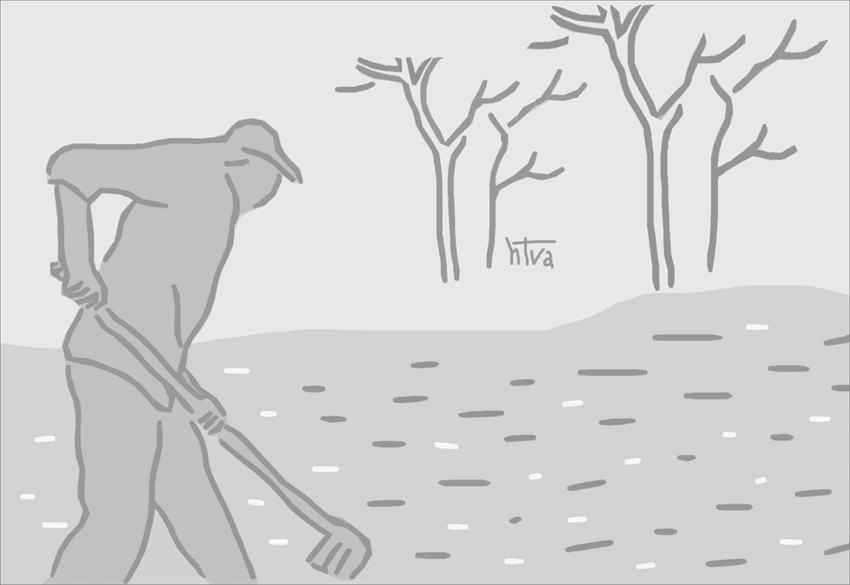 |
In everyone's eyes, the old man was truly fortunate. His maid even brought his three meals to his room; she even washed his underwear after he showered. The first time he heard the blaring siren of the garbage truck at the gate, he hurriedly went downstairs to grab his trash can. The next time, ignoring the sizzling oil in the pan on the stove, the maid rushed to take the trash can from his hands, sighing apologetically, "If you do that, the masters will scold me to death." His son tried to stop him from watering the potted plants in the front yard, saying, "Father, rest up, don't carry all that heavy stuff, you might fall and get hurt." Unable to stop him, the son hid the watering can. The maid competed with him by watering the plants twice a day.
When her son took her to buy a funeral banner for a relative, the old woman realized that there were still people in the town who appreciated classical Chinese calligraphy. Despite her shyness, she couldn't stop herself from pointing out the mistakes in the characters to the shopkeeper. The seller was only truly convinced when she explained which ancient saying or story the character was taken from. Like when Bo Ya met Zi Qi, the banner seller came to her house, they chatted for hours, and then proposed a collaboration. The customer said that the effort would certainly be considered, but the main thing was to review calligraphy and characters together. The homeowner smiled and shook her hand firmly, a promise made to her customer.
“That would take all day, it’s exhausting! Besides, the traffic on the streets is chaotic, it’s not a good idea, Dad!” His son’s words extinguished his joy. At first, he decided to do as he pleased, but he wasn’t familiar with the roads and didn’t want to bother his grandchildren with transportation, so he gave up on the idea with regret.
Her feet, accustomed to plowing the fields and stubble, now wander around the house; her "route" in and out is limited to just the bedroom and the gate. Sleeping little and watching TV all the time tires her eyes, she often lies stretched out on the bed, listening to the ticking of the wall clock.
After work, the son would visit his father in his room, saying, "What do you need, Dad? Just tell me." At the end of their conversation, the son repeated that familiar phrase. But before his father could even respond, he brought home a host of things. There were earplugs for better hearing, a treadmill, a massage chair, and a handheld massager. To save his father from going up and down the stairs, he bought a TV for his room and installed a doorbell so that family members could be there with just a press of a button. He also brought home a book on auspicious days written in Chinese characters, saying it was for fun. His father smiled sadly, "What's the point of good or bad days when the rain doesn't fall on my face and the sun doesn't hit my head?" His daughter-in-law stocked the refrigerator in the corner of the room with food and drink, but he rarely used it. Every week, she would replace the food and remind him to eat well.
When my mother was still alive, meaning before my father moved to the city to live with his children, they would visit every week. Seeing their father busy with village affairs, the children disapproved and, after much persuasion, finally retorted angrily, "Father, you're old and don't have a salary, why bother taking on all this work?!" My father enthusiastically corrected them, saying, "Why would it be tiring?" and then explained, "Even presidents change frequently, so what about these insignificant village positions? But having something to worry about, someone who needs me, is also nice."
The day he left his hometown, he was constantly troubled: "What will I do in the city, son? Will I just spend my days eating, drinking, and waiting to die?" This worry intensified, making him perpetually sad; unable to bear it any longer, he confided in his son: "Every day I just eat, sleep, take medicine, and tear off pages from the calendar... It's so useless!" His son smiled and encouraged him: "Everyone gets old eventually, Father. It's time to rest, time for us to take care of you." He looked at his son with loving but sorrowful eyes. It was also very sad when he stood on the balcony gazing longingly at his hometown in the twilight.
“Father is returning to offer incense and prayers to our ancestors. He intends to work with the elders to translate the family tree into the national language and supplement it, because fewer and fewer people will be able to read classical Chinese in the future. If God grants him good health, he will sell all the bamboo in the garden and hire someone to dig up the roots and plant vegetables and perennial fruit trees. Father doesn't have many days left, but he wants to give his children and grandchildren…” These were the few lines he hastily scribbled on a calendar on his desk, pressing it down with a ruler, before catching a bus back to his hometown.
Back in her hometown, she donned her protective gear, wore boots, and took her machete and hoe to the garden. The garden, overgrown with weeds after months of neglect, was meticulously cleared, dried, and burned before returning to the hoeing and tilling. Autumn had arrived, and the cool, gentle weather, along with nighttime rains, made the vegetable garden greener day by day. She worked tirelessly from morning till night, sometimes just standing and looking at the vegetables, her eyes sparkling with joy. The chickens in the coop and the ducks in the pond also looked healthier and more robust.
Street vendors often stop by, admiring the vegetable garden and inquiring about buying some, but the old woman smiles and shakes her head: "Let my son have it." Every Saturday, she harvests vegetables and fruits, putting each into a separate bag and then piling them all into a large sack; the chickens and ducks are kept in their coop; the eggs are placed in bags mixed with rice husks to prevent them from breaking. Her son's motorbike is laden with supplies from the countryside, as if he's going out to trade, but the father still insists on carrying more. Sometimes, watching the motorbike carrying the vegetables and fruits back to the city, the old woman finds joy in a quiet smile.
His agile movements and nimble hands as he wielded the hoe showed he was healthy, but his children were still worried. His daughter, who lived nearby, told her son to go to her parents' house to study and stay overnight. His son had a camera monitoring his father from afar; each time he returned, he repeated the same refrain: "Dad, just rest and get well." He expressed pity at seeing his father disheveled and covered in dirt; he compared his father to the poorer elderly people in the neighborhood, noting that although he wasn't poor, he looked more haggard. He suggested simple pleasures for old age, from playing chess and drinking tea to going on trips or visiting city with his children and grandchildren… The father responded with indifference and disjointed words: "Everyone has different joys and hobbies; why compare?"
After repeatedly advising his father "not to torment himself" without success, the son refused to accept the vegetables, fruits, chickens, and ducks. The father was saddened, his eyes downcast, his pleas filled with tears. The son gave in, setting a condition: "After this vegetable season, don't raise or grow anything anymore, Father." Looking at the garden overgrown with weeds again, someone suggested the old man grow vegetables to sell. He responded with a weary shake of his head: "I did it because I wanted my children and grandchildren to have clean vegetables, but now they don't need them anymore…" The old man's voice choked with emotion.
The son returned home, delighted to see his father leisurely reclining on the swing, gazing absentmindedly out at the yard. He smiled and said, "See, Dad, isn't this wonderful?" The old man jumped up, looked his son straight in the face, and unexpectedly raised his voice, "When no one needs me anymore, not even my loved ones, what joy is there in that!?"
The father stormed off, and the child watched him go, bewildered.
Source: https://huengaynay.vn/van-hoa-nghe-thuat/tac-gia-tac-pham/khi-khong-ai-can-nua-152474.html




![[Photo] Prime Minister Pham Minh Chinh presides over a meeting on private sector economic development.](/_next/image?url=https%3A%2F%2Fvphoto.vietnam.vn%2Fthumb%2F1200x675%2Fvietnam%2Fresource%2FIMAGE%2F2025%2F12%2F20%2F1766237501876_thiet-ke-chua-co-ten-40-png.webp&w=3840&q=75)






























































































Comment (0)